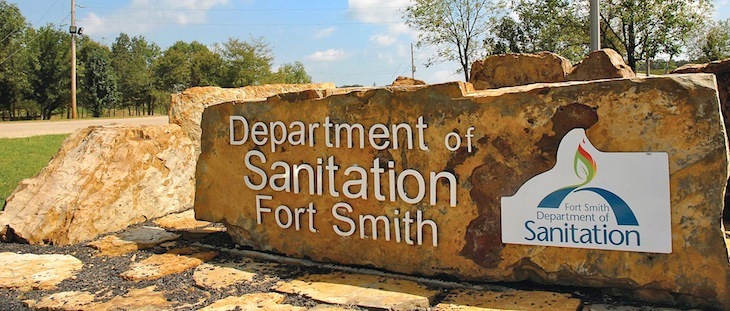State agency sets June 1 deadline on reporting of Fort Smith recycling credits
by May 31, 2017 12:52 pm 649 views

Fort Smith Deputy City Administrator Jeff Dingman has nothing new to report on the review of Fort Smith’s recycling program, but that will change with the Arkansas Department of Environmental Quality’s June 1 (Thursday) deadline.
An ADEQ representative told Talk Business & Politics on Tuesday (May 30) the agency had given the city the deadline in order to obtain information on how it had claimed recycling credits from October 2014-Present when it was admittedly sending over 91% of its recycled materials to the Fort Smith Landfill.
ADEQ Director Becky Keogh confirmed the review in a phone conversation with Talk Business & Politics last week, noting it was in progress and in no way a confirmation the city had done anything illegal. That said, she explained there were two areas of concern — grant funding and tipping fees.
Talk Business & Politics previously confirmed through ADEQ and the Sebastian County Regional Solid Waste Management District (SCRSWMD) the 2016 purchase of 1,000 recycling cans for the city in the amount of $56,285.28 in spite of the fact the city was knowingly sending most recycled materials to the landfill. Once there, the materials were contaminated and mingled with solid waste.
Where tipping fees come into play is in the structure for handling solid waste versus recycling. If the city takes solid waste materials to its landfill, it sends what is called a “tipping” or “gate” fee to the Department of Finance Administration (DFA). A portion of that money goes to ADEQ, Keogh said. But should the city claim the materials as “recyclables,” it receives a credit for those tipping fees as incentive for recycling. The question ADEQ is trying to answer: how much, if any, of the wasted recycling was reported to the ADEQ for credit?
Keogh reiterated the city may not have reported recyclables in such a manner given they knew of the issue going back to 2014, but said there could be responsibility “in arrears” for any credits to which it was not entitled. For calendar year 2016, the city received 248,728.93 tons of solid waste and reported reductions of 4,570.5 tons, paying $366,237.56 ($1.50 per ton) in disposal fees.
According to an ADEQ statement, “Disposal fees are sent directly to ADEQ from the solid waste facility. No more than 20% of the funds collected are used by ADEQ for the administration of a solid waste management and recycling program. The remaining moneys are deposited in the Solid Waste Management and Recycling Fund which is distributed to the eighteen Regional Solid Waste Management Districts (RSWMDs). The City of Fort Smith is part of the Sebastian County RSWMD.
“Currently, ADEQ is reviewing the City of Fort Smith’s waste reduction credits. Regulated Waste Operations requested information on the waste reduction credits that were claimed on the quarterly disposal fee reports for calendar years 2015 and 2016.” Fort Smith Landfill Director Alan Spangler received the initial request and has not yet responded. Dingman said in an email on Wednesday (May 31) he would provide the requested information to Talk Business & Politics at the same time the information goes to ADEQ.
Last Tuesday (May 23), Fort Smith City Administrator Carl Geffken said he anticipated that Dingman “will be able to provide additional information later this week.”
RECYCLING PROBLEM SUMMARY
The city of Fort Smith collected an estimated 8,667.46 tons of recycling from October 2014-May 1, 2017. This estimate encompasses 6,073.46 tons of recycling from October 2014 through June 2016 while the city still had an informal agreement in place with Green Source Recycling Center out of Clarksville, Ark. That ended in late June 2016, after which all materials were landfilled. From the 6,073 number, 5,322.14 tons (87.63%) were disposed of at Fort Smith Landfill, where the city also sent 100% of the 1,478 tons it collected from November 2016-May 1, 2017. This latter data was revealed shortly following the May 1 press release from city administration that incorrectly stated the practice had only occurred from November 2016.
Averaging the 27 months of hard data on total collections equals more than 279 tons of recycling collected per month. Using that figure to fill in the four-month gap (July 2016-October 2016) arrives at an estimate of 7,916.14 tons of recycling that were landfilled during the full 31-month period.
In short, the city likely collected 8,667.46 total tons of recycling during the period under review by the ADEQ and recycled only 751.32 tons, or 8.67%. Green Source rejected the vast majority of materials during its agreement with the city due to quality concerns and accepted the last partial load on June 27, 2016.
The Fort Smith Board of Directors continues to seek short-term and long-term solutions to the recycling issue to weigh proposals between Smurfit KAPPA and Third Rock Recycling. Information on those two plans are available at this link. The Board directed administration to continue negotiations with the two companies and also be open to additional proposals at the May 23 study session with the intention of a recommendation next Tuesday (June 6).
